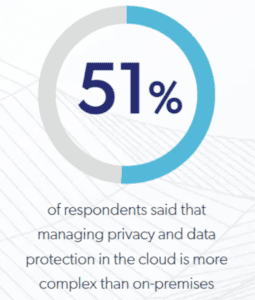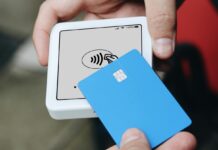As the demand for SaaS solutions continues to increase, there comes a great challenge for B2B SaaS businesses: data security and privacy.
From contact information to credit card numbers, the amount of personal information that businesses collect from their customers has gone over the roof over the last few years.

This means that business owners must always ensure that their customer data is secure around the clock.
However, while most SaaS companies understand the risks brought about by data breaches and identity theft, there is still another challenge.
According to a 2022 2022 Thales cloud security study report, 51% of SaaS providers agree that managing data security and privacy in the cloud is more complex than on-premises:

So how do you ensure maximum privacy and security for your business and customer data?
In this article, you will learn 5 data security and privacy best practices in B2B SaaS subscription businesses.
Let’s get started.
1. Ensure Transparency with Your Data Practices
When it comes to data privacy, 64% of customers say most companies aren’t transparent about how they use personal information.
That means that many SaaS users aren’t sure about what information providers are collecting and why. As well, customers can’t make informed decisions about how to use the software you provide.
To ensure data security and privacy in B2B SaaS, you need to let customers know how you intend to use their data, where you store it, whether you’re sharing it with third parties, etc.
It’s also a good idea to inform SaaS users how long you intend to store their data and whether they are allowed to access it or modify it.
Letting customers know all this is beneficial for you and your customers. It increases customer trust and hence can increase your customer retention rate.
Pro tip: Subscription management is a complex task for many businesses out there. Nevertheless, good subscription management is essential for achieving success and growth for your SaaS business.
Read this guide on subscription management for SaaS businesses to learn everything about subscription management.
2. Leverage Data Encryption
While encryption is the number one tool to protect data in the cloud for 59% of the respondents in the study mentioned above, only 50% say that more than 40% of their sensitive data in the cloud is fully encrypted.
Unlike traditional software solutions that are protected by firewalls, SaaS solutions use encryption and key management.
Encryption should be a top priority for keeping your and your user’s data secure and private.
Data encryption is simply encoding data into another form so that only those who have the correct decryption key or password can access it.
Data encryption keeps all sensitive information safe from theft and other unauthorized access. Plus, encryption helps to keep data safe from viruses and other malware attacks.
This is crucial for sensitive information like credit card numbers, social security numbers, and other data.
For B2B SaaS, encrypting software ensures that no one else can access the software, even the provider or anyone else without the key.
3. Prioritize Data Privacy and Protection
Customer concerns over data collection and privacy have increased in the past few years due to the rampant data breaches happening every day.
For that reason, B2B SaaS providers must work with their decision-makers to implement privacy policies into their business values and practices.
In fact, your SaaS product should be built with privacy from the ground. In other words, privacy should be at the top of your mind from when you plan to develop your product to the time it starts working.
To put this into perspective, if you were painting a house or picture, privacy would be your brush.
4. Educate SaaS Users
To a larger extent, a huge percentage of cloud security failures are caused by users.
Remember that more and more SaaS businesses are moving their operations to an entirely cloud-based environment.
Unfortunately, SaaS users aren’t aware of the consequences of this move.
You need to educate SaaS users about ensuring maximum data security and privacy when using your SaaS products.
Let customers know how to minimize data security issues by keeping their information safe at all times.
5. Leverage SaaS Backup Best Practices
In today’s world where data fuels almost all operations in all industries, losing data can be a nightmare for SaaS businesses.
And even though SaaS takes away the worries and costs related to having to maintain data in-house, it’s more important than ever to have a robust SaaS backup strategy.
Here are four SaaS data backup best practices to prevent data loss:
- Backup data in more than one location in the cloud
- Educate users on how to back up their data
- Back up data and metadata
- Monitor backed-up data constantly to know the health of your organization’s data at all times
- Find a reliable data backup provider
Pro tip: Are you finding it hard to get an efficient subscription management software solution to streamline your subscription management process and maximize revenue potential?
This post by Attrock shares a roundup of the 13 best subscription management software you can use.
Conclusion
While SaaS enterprise software provides a host of benefits including enhanced scalability, the avoidance of on-premises hardware maintenance, and others, data security and privacy is still a concern.
To ensure the safety and privacy of your business and customer data, you need to follow the best practices outlined in this article.
Author Bio – Reena Aggarwal
Reena is Director of Operations and Sales at Attrock, a result-driven digital marketing company. With 10+ years of sales and operations experience in the field of e-commerce and digital marketing, she is quite an industry expert. She is a people person and considers the human resources as the most valuable asset of a company. In her free time, you would find her spending quality time with her brilliant, almost teenage daughter and watching her grow in this digital, fast-paced era.
Social connects: LinkedIn, Twitter















